ANALYSIS
Thirty years later, the critical question remains — what was Nkosazana Dlamini Zuma really all about?
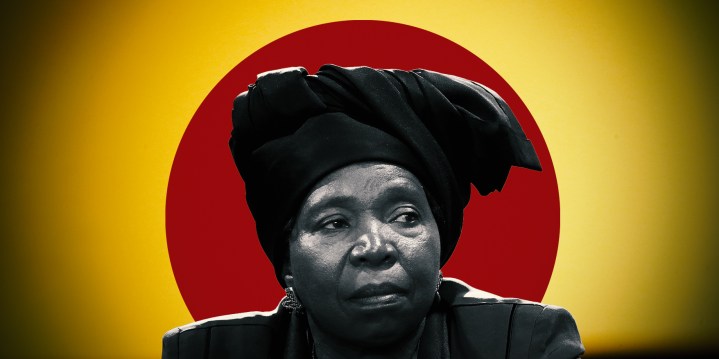
The confirmation through a leaked letter that Dr Nkosazana Dlamini Zuma will be retiring from Parliament marks the end of an extraordinarily long era in our politics. But, after all these years, it is not entirely clear what she stood for.
The minister in the Presidency for women, children and persons with disabilities, Dr Nkosazana Dlamini Zuma, has enjoyed sizeable political power and was stopped just a hair’s breadth from becoming the first female leader of the ANC. Much of her career has reflected important shifts in our politics, as power moved towards and then away from Thabo Mbeki and Jacob Zuma. And, some of it has been marked by scandals that helped define the ANC of today.
It is difficult for many to imagine what South Africa was like just after 1994 when Dlamini Zuma took over the National Department of Health. The best hospitals had often been reserved for white people, healthcare was much more hierarchical, abortion was illegal and people smoked — everywhere.
Perhaps the biggest contribution Dlamini Zuma made to South Africa was the major changes she introduced as Nelson Mandela’s health minister (1994-1999).
Within that five-year block, she introduced a new framework for the health sector, instituted court action against international pharmaceutical companies over their insistence on patents for HIV medications, oversaw the legalisation of abortion and introduced legislation banning smoking in nightclubs and bars.
We must never forget just how huge the opposition was to those bold moves.
Many in the ANC had a moral objection to abortion, pharmaceutical companies hired top lawyers, and the tobacco industry did what it always does.
In the end, her efforts had a significant positive impact on our society.
Of course, she was not alone, and the ANC was perhaps at the height of its political power and legitimacy. Still, she was the person who had to make major decisions and bear responsibility for them. Many millions of people are still benefiting from the changes she introduced.
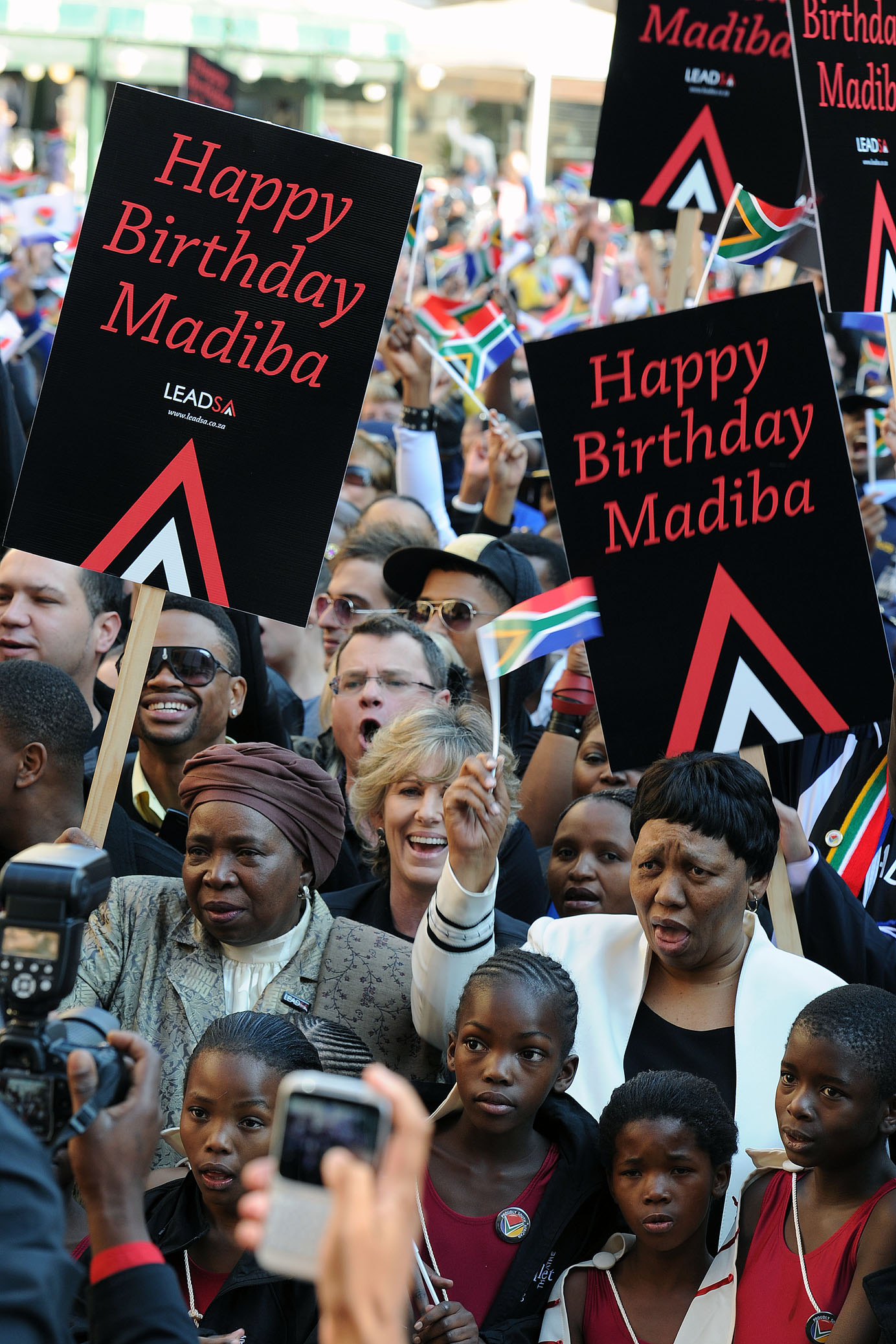
Ministers Nkosazana Dlamini Zuma and Angie Motshekga joined a crowd at Nelson Mandela Square to sing ‘Happy Birthday’ to former president Nelson Mandela on 29 May, 2012 in Johannesburg South Africa. (Photo: Gallo Images / Daily Sun / Sipho Maluka)
Scandals
However, this period was not without scandal.
First, there was Virodene, a dangerous industrial solvent its creators claimed would cure HIV. It did not.
But that did not stop Dlamini Zuma from putting intense pressure on the Medicines Control Council to lift its ban on clinical trials of the product.
It is still not clear if this was her decision, or if she was implementing policy being made elsewhere.
This was overshadowed by Sarafina 2. The play cost more than R14-million (this was back in 1995 when a million rand went a lot further than it does today) and was not helpful in the fight against HIV-Aids.
It was probably the first big scandal of the ANC government (followed quickly by the Arms Deal).
One of the first investigations by the new Office of the Public Protector raised important questions about the funding for the play.
Despite all the commotion, Dlamini Zuma was able to convince Mandela to use the ANC’s majority to stop investigations into the saga.
It was a major moment for our democracy. As Ray Hartley noted in his book Ragged Glory: The Rainbow Nation in Black and White, “The belief that the new order meant that the executive would account to elected MPs had been dealt a major blow. When the chips were down Mandela came down on the side of his Minister who suffered no consequences, other than the embarrassment…” of being reported on in the media.
In other words, the roots of the Nkandla scandal (which still reverberates today) and Phala Phala stem from how the ANC protected Dlamini Zuma at this time.
Through all of this, Dlamini Zuma was at the forefront of two other important dynamics in our society:
- She was one of the first prominent black women to hold a key post in SA’s Cabinet.
- The independent media, still largely white-owned at the time and serving mainly white audiences, was intensely critical, even hostile towards her.
She was at the convergence of these dynamics. It must have been incredibly difficult. Her reticence to conduct many interviews later in her career may well have its roots in her experience then.
Dlamini Zuma’s 10 years as minister of foreign affairs coincided with a time when then-President Thabo Mbeki was playing a major role on the international stage. She may well have found this office easier, because she did not have to drive change as she had while at the Department of Health.
She played an important role in Mbeki’s policy of “quiet diplomacy” towards Zimbabwe, when then-President Robert Mugabe was inciting people to forcefully occupy land controlled by white farmers.
Her closeness with Mbeki at the time was reflected in the turmoil in the ANC.
In 2007, she stood as deputy president on Mbeki’s slate at the ANC’s Polokwane Conference, despite the fact their opposition was led by her ex-husband. She lost to Kgalema Motlanthe.
That slate’s defeat led to profound changes in the ANC, the recall of Mbeki and the formation of Cope.
Home Affairs, African Union and 2017 conference
In 2009, Jacob Zuma, now President, appointed her to the Department of Home Affairs, where she continued an important restructuring process. While some changes had been introduced before she took the position, passport applications began to be processed in days rather than months, and the entire system was computerised (ANC stalwart Mavuso Msimang was the director-general of the department during this time and played an important role in this).
By this stage, it appeared Dlamini Zuma was moving much closer to the political unit controlled by Zuma.
In January 2012, she contested for the position of chair of the African Union (AU) Commission (despite a previous convention that more powerful countries would not nominate their citizens for this position).
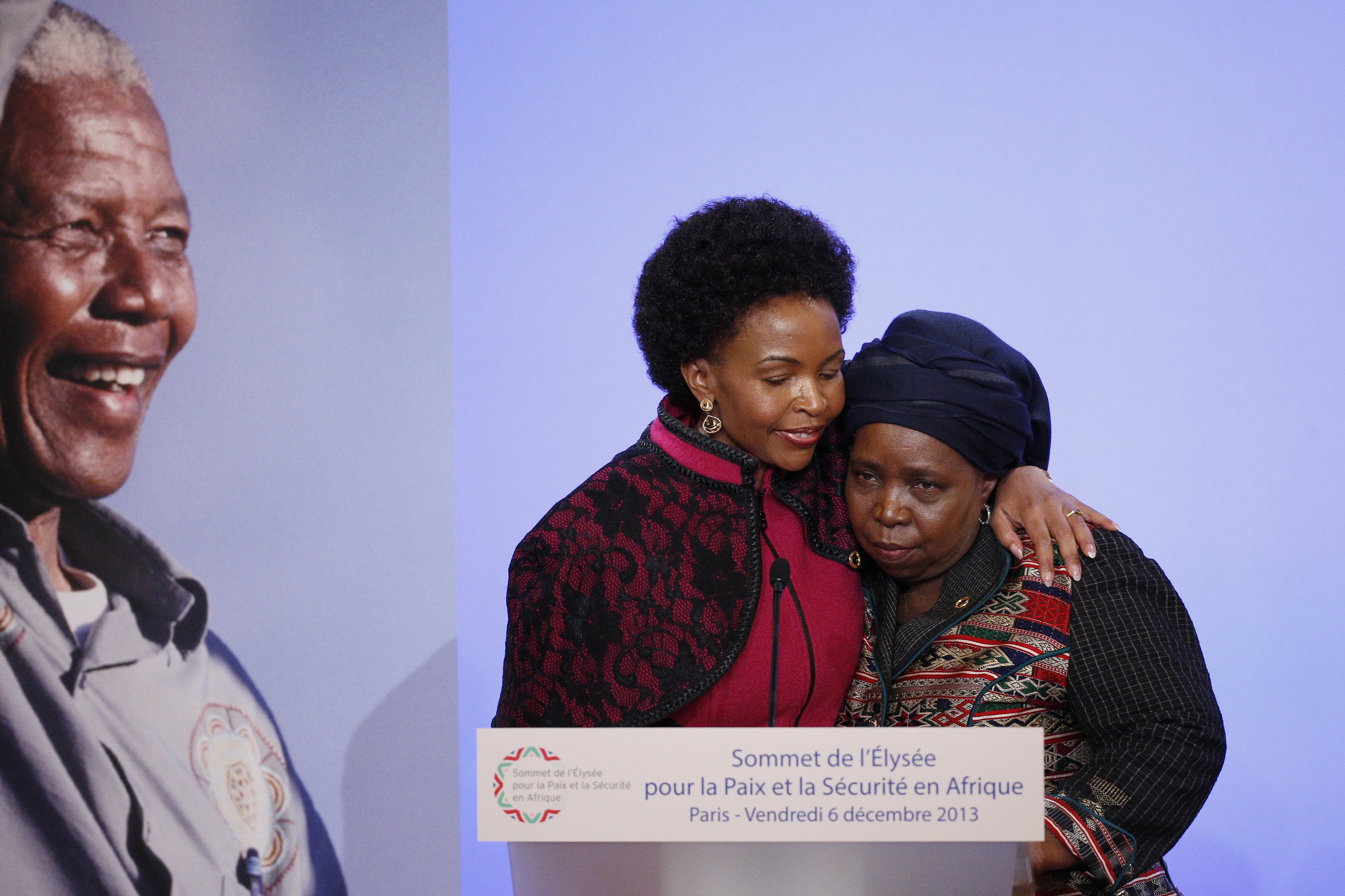
South African Minister for International Relations and Cooperation Maite Nkoana-Mashabane (left) embraces then-Chairperson of the African Union Commission Nkosazana Dlamini Zuma (right), next to the portrait of Nelson Mandela, as part as the Elysee Summit for Peace and Security in Africa at the Elysee Palace in Paris, France on 6 December, 2013. (Photo: EPA/Yoan Valat)
Already, it appeared that one of the reasons Zuma wanted her in this post was to move her away from domestic politics. The theory was that this would ensure there could be no scandal around her and thus she could challenge for the position of ANC leader in 2017.
Indeed, when she left the AU in January 2017, it was reported that many at the AU headquarters believed she had spent most of her term preparing for the 2017 ANC conference.
After returning to South Africa, it appeared that she was campaigning as the candidate for Zuma’s political unit. It was clear that the ANC faced a decision between continuing with the Zuma corruption, or changing course with Cyril Ramaphosa, who promised a break from such style of governance.
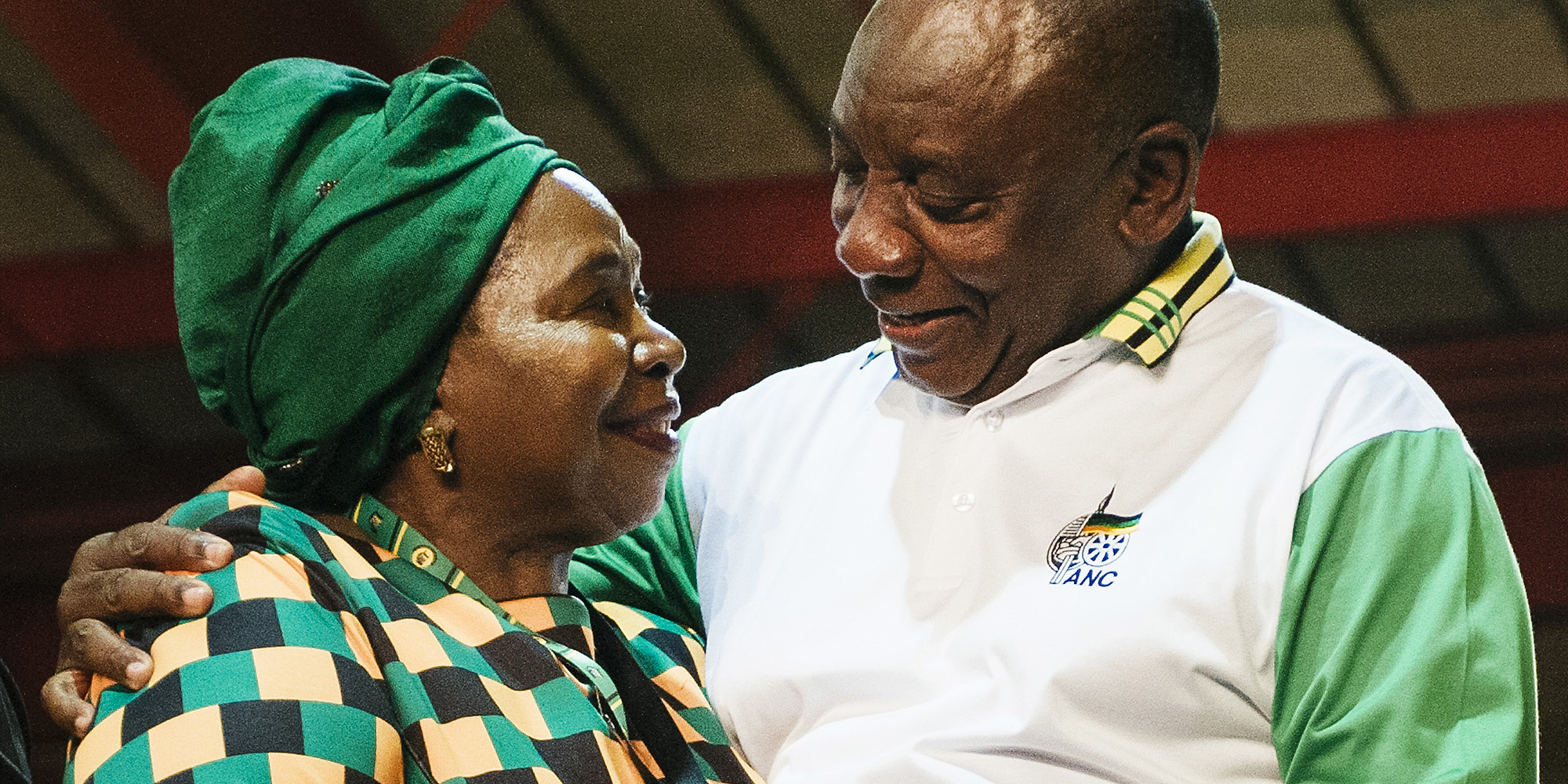
President Cyril Ramaphosa and minister Nkosazana Dlamini Zuma on stage during the 54th national conference of the African National Congress party in Johannesburg, South Africa, on 18 December 2017. (Photo: Waldo Swiegers / Bloomberg via Getty Images)
In public, she made some curious missteps.
In one case, in August that year, she went to Marikana in an apparent attempt to win support from people who had every reason to be critical of Ramaphosa (he had been a board member of Lonmin during the Marikana massacre, and he had sent emails calling for “concomitant action” in response to the violent strike shortly before the police killed so many mineworkers).
She had no track record of action or even commenting on the Marikana issue before, and yet her team arrived with a large convoy of supporters.
It was a disaster that saw her chased away from the area.
During this time she hardly ever spoke in public and granted just one interview, to the Gupta-owned and controlled ANN7.
As this reporter noted, “One of the main problems Dlamini Zuma faces is that we still don’t really know what she stands for.”
For some, this is still the case today. She has never communicated her view of the world or detailed the direction in which she wants our country to go.
Unfortunately, this has strengthened perceptions that she is a front for Zuma.
Despite these problems in her 2017 ANC campaign and despite the claims she had spent her term at the AU preparing for the conference, she lost — by only 179 votes.
The significance of that moment is sometimes forgotten. Ramaphosa was able to defeat the campaign of an incumbent who had access to immense state resources (Oscar van Heerden has written how Ramaphosa entered the headquarters of the State Security Agency at Nasrec, demanding to know what people there were doing).
If Dlamini Zuma had been a stronger candidate or acted differently, our history could have been very different. She might well have won and become our first woman President.
However, this was not nearly the end of her career.
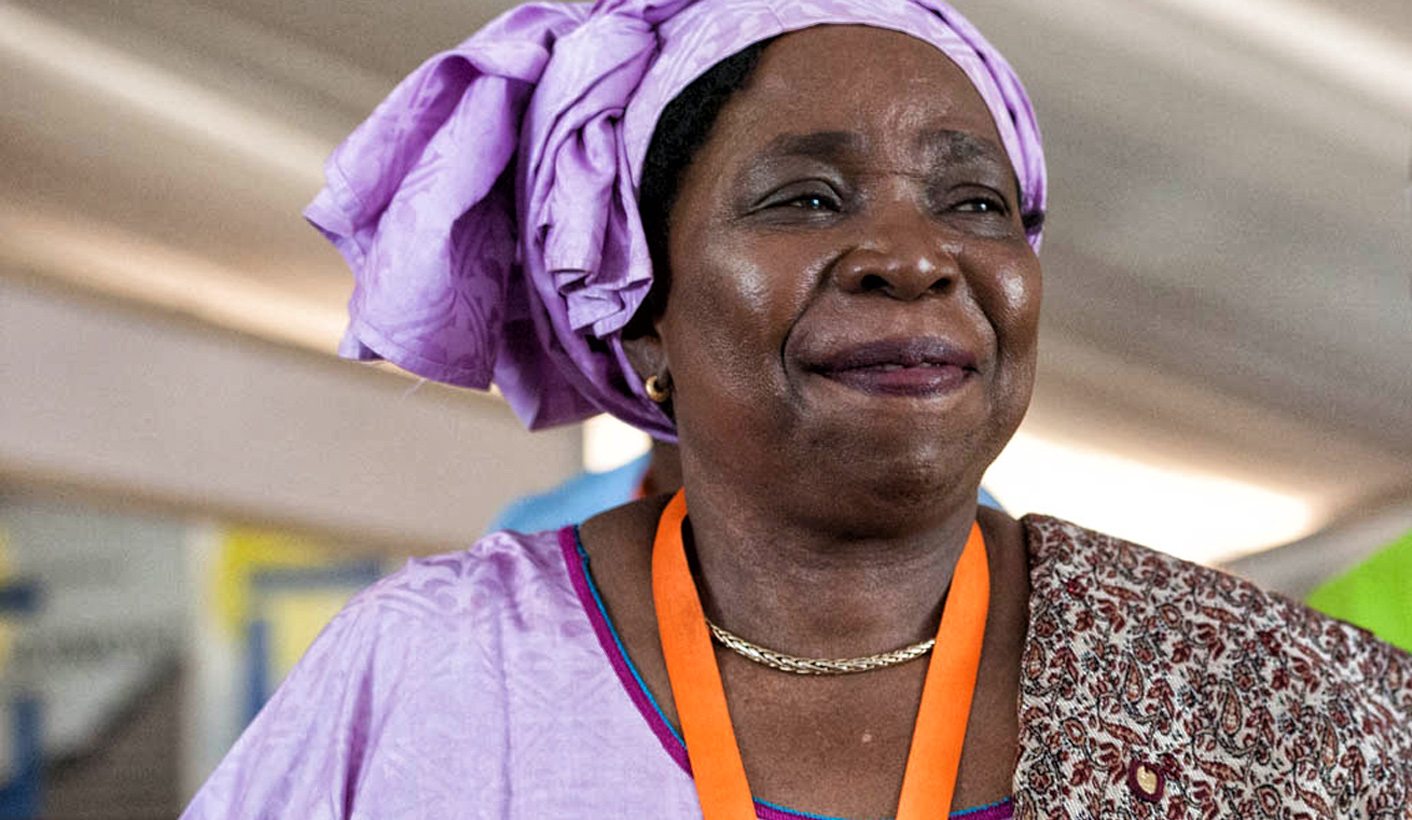
Nkosazana Dlamini Zuma toured the Progressive Business Forum at the ANC’s Mangaung conference on 19 December, 2012. (Photo Greg Nicolson/Daily Maverick)
The pandemic and defiance
She was given significant legal power during the pandemic. As the minister of cooperative governance and traditional affairs, it was she who signed the National State of Disaster regulations into law.
Some of these, such as the ban on the sale of tobacco and alcohol were maddeningly controversial, particularly after an image emerged of Dlamini Zuma with the self-confessed cigarette smuggler (and EFF donor) Adrian Mazzotti.
In more recent times, her most prominent political acts were to defy the party to which she had given most of her life.
At the height of the Phala Phala controversy, days before the start of the ANC’s 2022 conference, she voted against instructions to shut down the investigation into Ramaphosa’s role in the scandal.
However, despite threats by ANC leaders, no action was taken against her.
This may have encouraged her to do it again. In September last year, she failed to be present for the parliamentary vote to remove Busisiwe Mkhwebane as Public Protector.
From a person who had been a disciplined member of the ANC, this was puzzling behaviour.
She refused to explain her actions, which suggests she does not recognise Ramaphosa’s authority as a legitimate leader of the ANC, despite his two election victories.
Her defiant actions have also strengthened claims that she is still working with Zuma’s political unit.
Her decision to retire from Parliament may well lead some to suggest she will join forces with her ex-husband and support the new party, uMkhonto Wesizwe, although there is no public evidence of this. After such a long career it is unlikely that she would want to join a new party, her links to Zuma notwithstanding.
Dlamini Zuma has had a long and often influential career. The changes she made at the Department of Health were important and still resonate today. Her role in one of the first scandals of our democracy set a pattern. The way the ANC defended Ramaphosa over Phala Phala has its roots in how it defended her over Sarafina 2.
And she came very close to the top job.
But, after all these years, it is not clear what she stood for. There has been a reticence, understandable in some ways, to state her agenda in interviews. This is part of the long legacy of the ANC, which has seen many leaders refusing to answer direct questions over the years.
But still, after such a long and influential career, many people ask: What was Nkosazana Dlamini Zuma all about? DM



















 Become an Insider
Become an Insider
She stood for two things, theft and corruption
I really wonder just how many people Dlamini Zuma killed through the Virodene scandal by purposefully holding back anti virals. Since human lives are not a zero sum game, this is all that she should be judged for, the steps in the health department that are seen as positive such as the anti smoking laws would very likely have been implemented anyway, as these were already changing in the world as we know it. Like so many in the ANC, it was about money and power without any accountability. To bad it probably cost tens if not hundreds of thousands of lives. This article is way to forgiving in my opinion.
The defining moment of this odious woman’s career was an article in The Times. After denying she was buddies with self-admitted tobacco smuggler, Adriano Mazzotti, The Times published an article under the banner “Smoked Out”, with a gap-toothed NDZ beaming next to Mazzotti at a social event. So much for this cadre’s so-called opposition to smoking. There is very little doubt that her campaign against smoking was, ahem, a smoke screen to further her equally odious family’s tobacco smuggling activities. Then there was also Sarafina, in which this horrible woman’s true ANC colours shone through – she is as corrupt as they come.
Good riddance to yet another useless, corrupt, thieving, backward cadre.
She stood (and still stands) for the ANC = corruption, graft, theft etc. Rather sad. I was involved with an NGO and we successfully lobbied to get the condition we represented on the list of treatments that medical aids are forced to pay for, even though it is very expensive.
Sadly, I think she lost her way over the years subsequent to her tenure in the health ministry.
“Some of these, such as the ban on the sale of tobacco and alcohol were maddeningly controversial, particularly after an image emerged of Dlamini Zuma with the self-confessed cigarette smuggler (and EFF donor) Adrian Mazzotti.”
They were instructive more than maddening. Only dimwits able to convince themselves that she and her posse are anything other than world class rent seekers found anything to be confused by. Her son is in the same business as Mazzotti and she followed a failure proof recipe for growing a criminal trade exponentially, i.e. prohibition, in the full knowledge that we have no capacity to enforce it. R5 bucks says that her families wealth doubled during lockdown alone.
She was a disappointing Minister of Health. As with the country, the sector needed major restructuring for the post apartheid era. It needed serious rationalisation to provide a huge expansion of capacity for the black population, and the white middle class needed to be kept happy and persuaded to that newly integrated services would provide good quality care for all. This meant a major focus on the system productivity and professional management. It got none of that. No strategic plan for rationalisation and expansion was ever adopted and instead of tasking experienced white managers with a new mandate and with mentoring new black managers, the system was soon handed over to amateurs with no guidance (I know, I was one…) and then to corrupt party cadres. The result was the middle classes soon deserted the system, stripping it of most doctors, and began to build the exclusive, hugely expensive, wasteful private system we know today. The public sector is still mostly an unmanaged mess. And there is still no strategic plan for the system.
You excellently state a critical point about the state of public Services and how they came to their depressing state today.
The collapse of the public Services is as much about neglect and poor strategic leadership. Your example of public healthcare represents, I think, most public Services.
A public infrastructure that was planned and built for about 5 million people suddenly had to provide for 40-odd million (1990s population. A massive challenge, undoubtedly.
We know what followed. Not only did the government (ANC) not build new infrastructure to meet the suddenly expanded (and continually expanding) eligible population; they did not maintain or significantly upgrade existing infrastructure.
This is why, 30 years later, they really have no excuse and no credible reason to ask for anyone’s vote except for their tenderpreneur buddies.
I was born in 1988 so my lens is admittedly skewed by my short life so far, but nothing leads me to believe anything will change with the current crop in charge.
Great article. While NDZ is not a politician I revere, I do personally give great thanks for her anti smoking influence.
in this regard, when traveling abroad, i am often impressed at how SA has taken such a positively strong stance against smoking. It is disgusting walking in many European cities & seeing the smokers everywhere. Big burden on the healthcare system.
The word Dour about sums up NDZ “. Oxford dictionary: unsmiling, humourless, severe, fanatic, unsympathetic, sour, dismal, sullen.
I think she has been the most unliked minister we have had to date and I am not sure she made any positive contribution, overall, to either SA or Africa. She will not be missed by a vast majority of people.
You forgot to mention her Personality – Like that of a Can of Baked Beans!
More and more Steven does a soft-shuffle egg-dance and has long since lost his sharpness in favour of I’m not sure what? SABC job? Friendly to all so he doesn’t lose access to interviews with politicians – there could be many reasons. But in reality Nkosazana Dlamini Zuma was a blight on this country and a pioneer of corruption, her cigarette ban during covid massively helped her gangster friends in the illicit tobacco industry, and she was quite unashamed about that, citing the need to assist “the township economy”. She helped drive the ANC’s SA Cuban agenda and almost fainted each time she heard Spanish or greeted her former Russian Cannon-fodder Cubans at airports. She lied to parliament about the R14M and she lied to SA about the R14M It’s not tax money she said, it’s grants from France!!) and as Steven (finally) states, she helped set the template for executive UNACCOUNTABILITY. So no, her parting does not equate to the end of an ‘era’ as Steven puts it – it’s simply another failed, lazy, connected corrupt cadre riding into the SA sunset.
“ what was Nkosazana Dlamini Zuma really all about?”
Definitely not public service. She is about power, money and vindictive populist policies : basically an older, female version of Malema. If she and her faction won that election, we would now have a million more emigrants and the likes of Ace, Mkhize, Gigaba, Myeni, Mkhwebane, Molefe etc running the country into the ground.
“Seeds that lay fallow” is how Ray Hartley introduces to us the nefarious actions of this unsavory kleptocrat ahead of and after Sarafina 2. I can only agree with Stephen that the latter scandals by the once glorious movement found their seeds in how they protected the disgraced Nkosazana.
My grandmother worked in the radiology department at Red Cross in the early days of democracy and would save her yearly curse words for this character. I didn’t understand why at the time, but it’s apparent now.
She ate well.
As do most of our “leaders”. There is a old saw – ‘same trough; different pigs’.
NDZ’s contribution to South Africa is paltry, at best. Moves towards banning smoking in public places were gaining momentum globally, and would have happened here one way or another. She was also single-handedly responsible for the explosion of illegal cigarettes (and their links to organised crime), and resultant loss of tax revenues during Covid and ever since. Curiously, Grootes also doesn’t mention her failed attempts at Soviet-style centralised command that she tried to introduce during Covid that would have centralised power in her hands as the minister – it would have been a chilling, disastrous development to have NDZ pulling the strings in this country, given her closeness to Zuma and his cronies.
Closet Dictator is my view.
Good piece by Grootes again.
I still somehow think her retirement shows how close the ANC is to a split.
Good riddance to bad rubbish! Nothing but a useless, racist, dour and sour politician, who surprising had the clout to come out strongly against corruption, nepotism, grand theft and looting of SA etc but chose to remain silent, thereby giving the green light to the predators, thieves and parasites in her party and government. As she did for the 1st Zimbabwean election that she rubber-stamped as free and fair. The sooner she disappears , the better!
Sometime Stephen you need to forget the Politics 2 and go back to Journalism 1.
She is leaving parliament a very, very rich woman.
From being a doctor, a hard job, which is well paid but not spectacularly well paid, she is now a Rand billionaire.
Not bad for 30 years of selfless public service.
I am no fan of the lady but this brilliant piece of journalism is perhaps a call for us to try to get beyond black and white (no pun intended) and consider that even the worst among us may have made some contributions…
She has had a long but not distinguished career. She came close to the top job not because of any actual competence but rather simply by virtue of her gender. She is one of very many grossly incompetent ANC “leaders” that has brought South Africa to the brink of failed State status over the tenure of ANC rule. When in 1994 South Africa had the world in its hands.
What a load of drivel. I often wonder how as a country we came to this, and this is part of the problem: dressing up self serving apparatchiks as ‘complicated’. Her brutal, authoritarian inclinations have always been apparent and her disdain for ordinary South Africans, palpable (particularly during the pandemic). Not to mention her incredibly thin skin.
Commenting on this abysmal ANC “leader” wastes ink, and leaves less space for tackling the destructive and shameful goings-on of those still in power.
She’s gone, thank goodness, and that’s all that matters.
Who cares for what she stood for?
I’m inclined to agree. Rather measure her by outcomes to get the measure of the person.
If you do proper research, you’ll find that she’s unique than many DA Headquarterers.